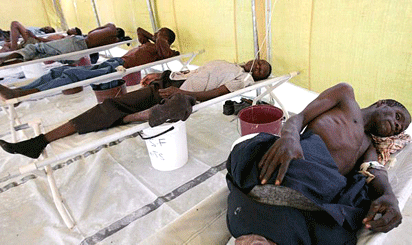
By Sola Ogundipe
In the wake of the cholera outbreak in the country, Nigeria has initiated discussions with the Global Alliance for Vaccines and Immunisation, Gavi, towards obtaining emergency supplies of the oral cholera vaccine (OCV) as the country battles the disease amid a global shortage of the vaccine.
The Director-General of the Nigeria Centre for Disease Control and Prevention, NCDC, Dr Jide Idris, who disclosed this in Abuja, said that the Coordinating Minister of Health and Social Welfare, Prof. Muhammad Ali Pate, was leading the discussions with Gavi.
Nigeria utilises three World Health Organization, WHO, pre-qualified oral cholera vaccines, Dukoral, Shanchol, and Euvichol-Plus, The three vaccines require two doses for full protection, and are administered only to persons and groups at high risk such as travellers to areas with active cholera transmission or people living in areas experiencing outbreaks.
On the latest development, Idris said, “Gavi, a global health partnership, plays a pivotal role in improving access to vaccines in low-income countries. Through these negotiations, Nigeria aims to secure an emergency supply of cholera vaccines to curb the outbreak.
“Cholera vaccines are not stocked in our public facilities, though they are available in limited quantities in the private sector. But vaccines alone are not the only preventative measures we have at the moment; we must also ensure environmental cleanliness and proper hand hygiene.”
Further, Idris explained that there is a surge in global demand for cholera vaccines leading to severe shortage, even though he noted that the limited supply has strained efforts to control outbreaks in endemic regions, including Nigeria.
“Poor sanitation, inadequate clean water supply, and limited healthcare infrastructure have exacerbated the spread of the disease, but in response to the crisis, the NCDC has intensified its public health campaigns, emphasising hygiene practices and the importance of clean water.
“However, these measures alone are insufficient without adequate vaccination coverage. The shortage of vaccines has hampered mass immunisation campaigns, crucial for preventing spread of cholera.
“The situation in Nigeria underscores broader issues of global health equity and preparedness. It highlights the necessity for increased vaccine production and distribution infrastructure investment,” Idris stated.
The NCDC D-G called for stronger international collaboration to ensure that life-saving vaccines reached the most vulnerable populations promptly.
He regretted that cholera, an acute diarrheal disease caused by ingestion of contaminated water or food, remains a persistent health threat in Nigeria, with the outbreak significantly impacting several states, leading to deaths and overwhelming healthcare facilities.
In 2021, Nigeria received approval from WHO for over 3.5 million doses of the oral cholera vaccine. In 2022, the country requested an additional nine million doses of the vaccines.
Disclaimer
Comments expressed here do not reflect the opinions of Vanguard newspapers or any employee thereof.